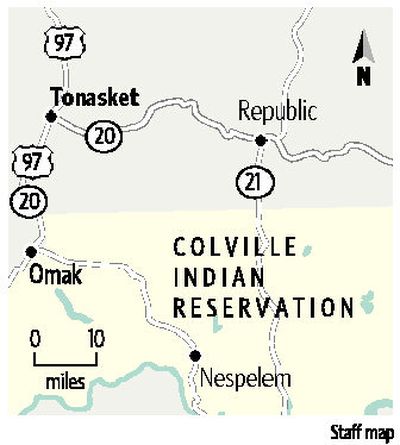Small town has big event for activists

Tonasket, Wash., seems an unlikely epicenter for a peace movement, but then, so did Crawford, Texas.
On Saturday, three of America’s most prominent grass-roots anti-war activists will take part in the fourth annual Okanogan Peace Festival in the town of fewer than 1,000 people.
Cindy Sheehan will speak at 1 p.m. The Vacaville, Calif., woman has been the most recognizable face in the anti-war movement since the 2004 death of her son Casey Sheehan in Iraq. Her protests outside President Bush’s Texas ranch aroused passions on both sides of the Iraq war issue.
Later in the day, Craig and Cindy Corrie, of Olympia, will discuss their daughter, Rachel, who was killed trying to stop an Israeli bulldozer from demolishing a Palestinian home in the Gaza Strip in 2003.
Why are such renowned figures in the peace movement coming to Tonasket?
Denny Richardson asked them to. He and his wife, Paulie, founded the event in 2004 and organized it every year since. Richardson said he asked Sheehan to come last year, but she was already booked. This year when he asked, he was surprised to get a call back.
“It is the small-town grass-roots effort, that’s what’s drawing her,” Richardson said. “She is excited about it because it’s staged by a family like her own.”
The Richardsons also have lost loved ones in the military. Paulie’s little brother, who was in the Air Force, died in an accident in Turkey in 1989. Denny lost a cousin to a truck bomb in Lebanon in 1983.
Richardson, of Omak, is a native of Okanogan County, a largely conservative area but one with a history of liberal activism dating back to the International Workers of the World early in the last century. The northern part of the county is home to many of what Richardson calls “back-to-the-land-type people,” and each year Tonasket draws thousands to the Okanogan Family Fair, also known as the barter fair.
The peace festival draws regional and local musicians, poets and fellow activists. The Corries were in Tonasket once before to deliver a presentation. Since then, the biggest name to appear was Dana Lyons, an American folk singer with a No. 2 hit in Australia, “Cows with Guns.”
Richardson said Lyons can’t make it this year.
The national group, Veterans for Peace, has been involved with the festival since its beginning, Richardson said, and last year’s event was dedicated to Sean Daly, a prominent member from Colville, who died in 2006.
“We are trying to give a place where people can talk about things,” Richardson said. “I’m trying to bring a voice to veterans and those families who have lost loved ones in this war.”
But Richardson said he strives to make the festival respectful of all points of view. He shuns conflict and delayed announcing this year’s keynote speaker, Sheehan, in hopes of keeping the event a celebration of peace not a venue for conflict.
It’s unclear how some of the region’s conservative politicians feel about Saturday’s antiwar event.
State Rep. Joel Kretz, whose 7th District includes Tonasket, did not return a call to his office on Wednesday nor did county Sheriff Frank Rogers, a fellow Republican. Okanogan County Commissioner Mary Lou Peterson said through a courthouse spokeswoman that she would not be attending the Peace Festival because of a prior commitment.
Sheehan has been the focus of antiwar activism and pro-administration criticism since she camped out in front of Bush’s ranch in August 2005. She could not be reached for comment. The nonprofit festival is paying her way to Tonasket, but Richardson declined to disclose her itinerary.
When asked whether Sheehan knows just how far Tonasket is from big cities, Richardson said, “She does now.”
Sheehan’s visit to Tonasket will be her first meeting with the Corries.
“There were people who thought the two Cindys should be together,” Craig Corrie said of his wife and Sheehan.
Craig and Cindy Corrie plan to talk about their daughter and her writings. Rachel Corrie died at age 23. Since then, her parents have become peace activists themselves, traveling to Israel and the Gaza Strip town of Rafah, where Rachel died.
“Like most Americans, we were familiar with the Israelis’ story and sympathetic to it,” Corrie said, “but not familiar with the Palestinian narrative.”
In Rafah, the Corries met the family whose house was in the bulldozer’s path. The Corries’ daughter had slept in the house, which was spared the day Rachel died, March 16, 2003, but was demolished several months later. Corrie said he also met with Israelis who lost family members to suicide attacks.
Both sides, he said, “just want their children to grow into the type of people we would want our children to be.”